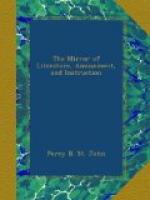A mere outline of the story will convince the reader that, as the Reviewer states, “the tragedy is alive from the beginning to the end;” and our extracts will we trust show the language to be bold and vigorous; the imagery sweetly poetical; and the workings of the passions which actuate the personages to be evidently of high promise if not of masterly spirit.
The tragedy opens with the recall of the Constable De Bourbon from Italy, through the supposed political intrigue, but really, the secret love, of the mother of Francis, Louisa of Savoy, Duchess of Angouleme, whom Miss Kemble calls the Queen Mother. In the second scene the Queen Mother communicates to Gonzales, a monk in disguise, but in, reality an emissary of the Court of Spain, her secret passion for De Bourbon, and her design in his recall.
Francis is introduced at a tourney, where he not only triumphs in the jousts, but over the heart of the beautiful Francoise de Foix.
Bourbon returns, and the second act opens with his interview with Renee, (or Margaret,) the daughter of the Queen Mother, and sister of Francis I., for whom he really entertains an affection. In the second scene the Queen Mother declares her passion to Bourbon, who, at first supposes he is to be tempted by Margaret’s hand, but finding the Queen herself to be the lure, he indignantly rejects her. The character of Bourbon in this scene is admirably brought out. The artifice of the Queen—the scorn of Bourbon—and the Queen’s meditated vengeance are powerfully wrought:
BOURBON.
I would have you know,
De Bourbon storms, and does not steal
his honours
And though your highness thinks I am ambitious,
(And rightly thinks) I am not so
ambitious
Ever to beg rewards that I can win,—
No man shall call me debtor to his tongue.
QUEEN (rising.)
’Tis proudly spoken; nobly too—but
what—
What if a woman’s hand were to bestow
Upon the Duke de Bourbon such high honours,
To raise him to such state, that grasping
man,
E’en in his wildest thoughts of
mad ambition,
Ne’er dreamt of a more glorious
pinnacle?
BOURBON.
I’d kiss the lady’s hand,
an she were fair.
But if this world fill’d up the
universe,—
If it could gather all the light that
lives
In ev’ry other star or sun, or world;
If kings could be my subjects, and that
I
Could call such pow’r and such a
world my own,
I would not take it from a woman’s
hand.
Fame is my mistress, madam, and my sword
The only friend I ever wooed her with.
I hate all honours smelling of the distaff,
And, by this light, would as lief wear
a spindle
Hung round my neck, as thank a lady’s
hand
For any favour greater than a kiss.—
QUEEN.
And how, if such a woman loved you,—how
If, while she crown’d your proud
ambition, she
Could crown her own ungovernable passion,
And felt that all this earth possess’d,
and she
Could give, were all too little for your
love?
Oh good, my lord! there may be such a
woman.




